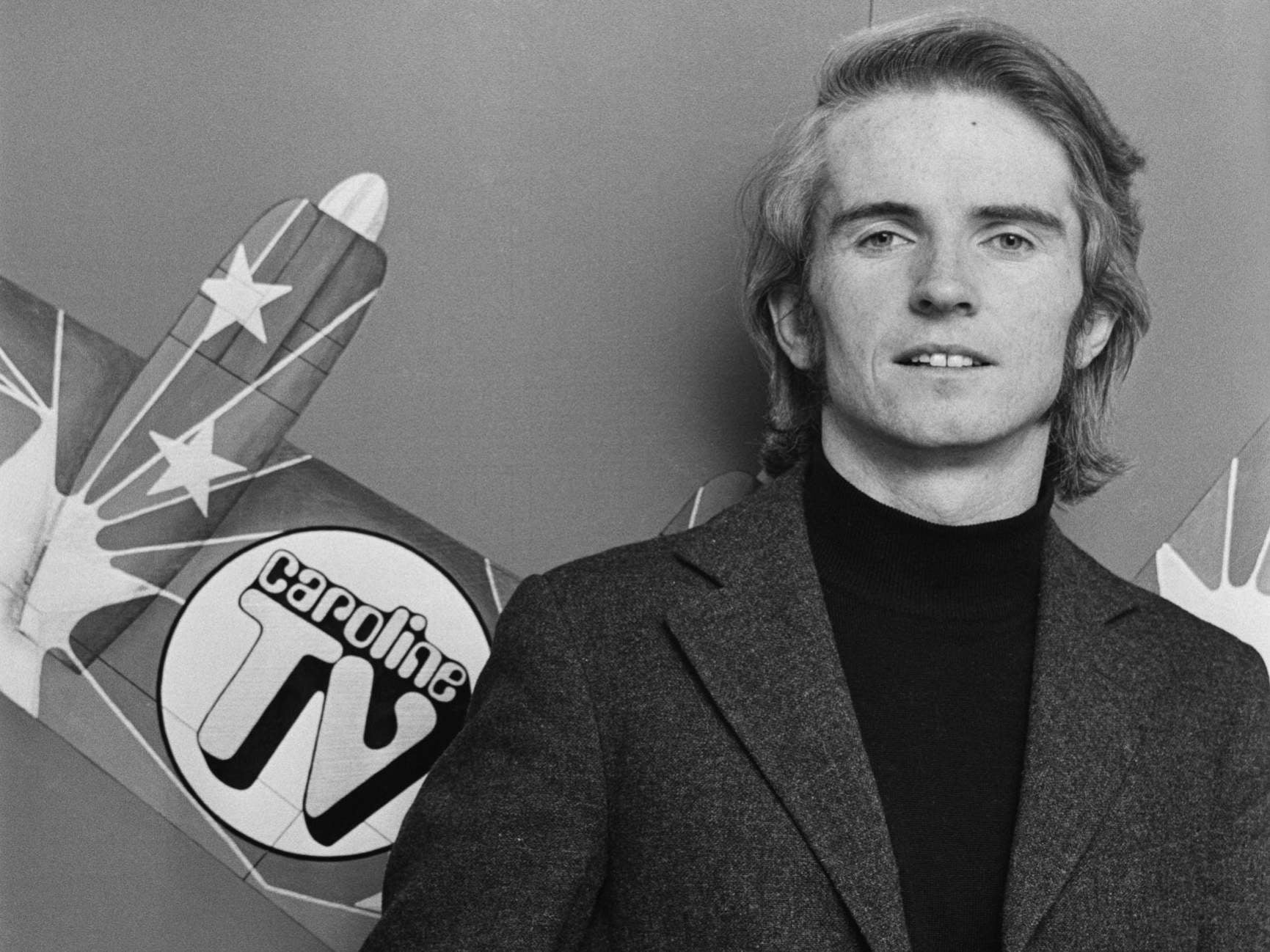Ronan O’Rahilly: Entrepreneur who started a revolution of the airwaves with Radio Caroline
He launched the first UK pirate station, angering the establishment, delighting pop listeners and triggering a huge cultural shift

Ronan O’Rahilly, who has died aged 79, was an Irish entrepreneur who unleashed a revolution in UK broadcasting by launching Radio Caroline, the first British pirate radio station, in 1964. The 24-year-old O’Rahilly found his radio station being damned by the British establishment and saluted by teenagers and rock musicians. A libertarian, O’Rahilly would remain a controversial figure.
Born to wealthy Irish parents who owned the port of Greenore in County Louth, O’Rahilly settled in London in the late 1950s, breaking into showbusiness as a song plugger. He claimed to have run a drama school teaching method acting, and said he managed The Beatles (briefly), Soho club The Scene, and Georgie Fame. His pirate creation myth involved him having recorded and independently issued a Fame 45, only to find both the BBC’s three weekly pop programmes and Radio Luxembourg refusing to play it because they only serviced the major record labels. Except no such Fame 45 exists and he never managed The Scene or The Beatles.
In late 1963 O’Rahilly met Allan Crawford, a London-based Australian music publisher, who, with Oliver Smedley – a Liberal Party grandee and free market evangelist – was determined to take on the BBC. Noting the growth of pirate radio stations in northern Europe, they had purchased Mi Amigo, a former fishing boat, to serve as Radio Atlanta, and invited O’Rahilly to invest.
O’Rahilly decided to set up his own station. Securing £250,000 of capital, he purchased a defunct ferry moored in Rotterdam, called this boat Caroline and sailed it to Greenore to be refitted for broadcasting. Caroline dropped anchor outside territorial waters off the Essex coast and began broadcasting as Radio Caroline on 28 March 1964, the first British pirate radio station. Radio Atlanta began broadcasting a month later.
On 2 July Radios Caroline and Atlanta agreed to a merger – some observers have suggested this rapid merger marks the stations as being jointly funded by the CIA – with O’Rahilly sailing to an anchorage off the Isle of Man and broadcasting as Radio Caroline North while Mi Amigo stayed in the Thames Estuary, now broadcasting as Radio Caroline South. This was the first time since the pre-war days that a commercial broadcaster could claim to be offering a national radio service.
Within a year the network was turning a modest profit, being debated in parliament, being listened to by hundreds of thousands of teenagers and inspiring other pirate stations, most notably Radio London and Radio Sutch (a Screaming Lord Sutch publicity stunt).
In 1967 an act of parliament outlawed offshore radio stations and launched Radio 1, the BBC’s first all-pop music radio station. Radio 1 was modelled on Caroline and employed Tony Blackburn, Simon Dee, Dave Lee Travis and Johnnie Walker, all of whom began their broadcasting careers on Caroline.
O’Rahilly refused to surrender, running Radio Caroline North and South until 1968 when they were forcibly towed away by a Dutch maritime supply company over unpaid maintenance bills. He moved into film, producing Marianne Faithfull’s 1968 feature Girl on a Motorcycle, and managing George Lazenby, an Australian model and actor who won the role of James Bond (after Sean Connery had left the series) for 1969’s On Her Majesty’s Secret Service. It was O’Rahilly who convinced Lazenby not to sign a seven-film contract as Bond.
In the build-up to the 1970 general election O’Rahilly and former Caroline and Radio 1 DJ Simon Dee toured the UK in a bus decorated with images of then-prime minister Harold Wilson as Chairman Mao while encouraging the public to vote Conservative. O’Rahilly and Lazenby then produced and acted (with Germaine Greer) in the 1971 feature Universal Soldier, a film that flopped and ended their working relationship. O’Rahilly then announced a plan to start a “pirate TV” station.
Pirate TV never eventuated so he relaunched Radio Caroline in 1972, using his station to promote the Indian guru Ram Dass’s philosophy of “loving awareness”. In 1976 he financed and promoted via Caroline a band called Loving Awareness. They attracted little interest – Caroline now had few listeners compared with Radio 1 – and, after splitting from O’Rahilly, became the basis for Ian Dury’s Blockheads.
Radio Caroline closed in 1980 when Mi Amigo sank during heavy North Sea storms. O’Rahilly relaunched Radio Caroline in 1983, running it until 1991 when a sustained campaign against it by the British, Belgian and Dutch authorities forced its closure.
Forever charming investors and claiming to be about to unleash new inventions, manage new musicians or produce new films (King Kennedy – an epic conspiracy theory documentary on John F Kennedy assassination – was his most obsessive, uncompleted project), O’Rahilly remained a King’s Road fixture until he was diagnosed with vascular dementia in 2013. He then retired to Ireland.
He is survived by his wife Catherine and stepson Caspian.
Ronan O’Rahilly, entrepreneur, born 21 May 1940, died 20 April 2020
Join our commenting forum
Join thought-provoking conversations, follow other Independent readers and see their replies
Comments
Bookmark popover
Removed from bookmarks